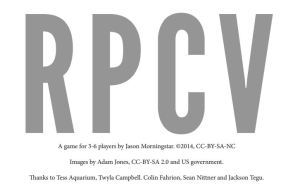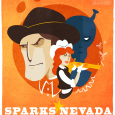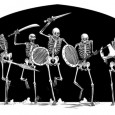 Players: Jason Morningstar, Colin Fahrion, Tess Aquarium, Jackson Tegu, Twyla Campbell, and Sean Nittner
Players: Jason Morningstar, Colin Fahrion, Tess Aquarium, Jackson Tegu, Twyla Campbell, and Sean Nittner
System: RPCV (Returned Peace Corps Volunteer)
As a judge in the Golden Cobra Challenge Jason wasn’t allowed to submit a game, but that doesn’t mean he would’t write one anyway! The RCVP larp takes place in an airport where all by one of the players plays a Peace Corps volunteer returning home from Burkina Faso. The last player is another traveler waiting for a plane, curious about the volunteers.
Each player starts with a small playbook that tells them the first letter of their name (T, G, etc), something about themselves, something that happened, and what they should do before and during the game. T, who is just waiting for their flight, is the timekeeper and lets us know when our flights start arriving (one hour into the game).
The game was rough. I don’t usually play terrible people and I didn’t even intend to in this game, but terrible I was. Part of that was because I wasn’t as dedicated to the cause as the others. That was just some baggage I walked into. But the real horror came because a question had to be answered. Something horrible had happened but what it was we hadn’t determined. We needed a focus for our contempt so I offered it up. My character A, had slept with one of the local women, gotten her pregnant, and then left. As atrocities go, that may seem mild but for me, a father that is divorced with joint custody of my children, the idea was a painful to even talk about in the abstract.
In play, we all wanted to find someone to blame and I was blamed a lot. Colin’s character S, who just didn’t give a shit was blamed even more but he seemed to take well enough. Not caring about what he had done made it easier to not care about what people thought of him. He was never going to be forgiven, nor ask for forgiveness.
My reaction was a juvenile one. When faced with an alien situation that I was not prepared for I became defensive and looked for someone else to blame. I just couldn’t examine my own actions so I focused on taunting Jason’s character G. G and A (my character) clearly both had feelings about Aicha and my focus was so narrow that I could only imagine that he was jealous of me for winning her affections. Not that he might have genuinely cared about her, or about all the other people who’s lives we impacted. So we argued and bickered over a picture of her. I taunted R until I finally prompted him to hit me, and then laughed as I felt blood trickling down from my split lip. I had somehow envisioned that an act of physical violence either to or against me would make me feel absolved of my guilt, but it didn’t change a thing.
Twyla’s character M had a single focus of feeding starving children, and none of us could match her intensity there. Jackson’s character B worked the hardest of all, and was probably the most appreciative of everyone else, but none of us could keep up with him. Something bad happened between him and the Djibissé Boys but we didn’t find out what it was. S fucking hated Burkina Faso and hated us all. He was the first to leave. T interrogated us and I think we were all found wanting.
We ended the game when the time was up. Our flights arrived and we left worse for wear.
After the game we had a debriefing. I remember apologizing enough times that everyone told me to stop apologizing.
Thoughts on the game
I realize that most of my AP reports spend most of the time focusing on what I did in the game because those are the things I remember best and they are also the things I feel I have the most license to fill in the blanks when there are gaps in my memory. This is a pretty extreme example of that. Besides Jason who I was directly in conflict with, and Colin who was just a big personality, I don’t remember the stories of the other characters. I can recall some hurtful interactions, and a little bit of how we were physically arranged (B and A traded places) but not what T or B or M were driving for or what they regretted most.
The instructions on each character to talk about something and not talk about something else is both a good spark for the conversation and a tool for ferreting out the horrible thing that happened. I kind of fucked that part up when we played and decided the conversation was going to be about Aicha and what happened to her. Outing myself identified the atrocity quickly, but probably too quickly, and without sufficient contribution from the others. Read the instructions Sean. Read the instructions.
I appreciate the emotional investment this game immediately established. I’m not sure I want that in my games. It feels authentic, but that’s a two way street and the shitty feelings in the game quickly become shitty feelings out of game for me. I wouldn’t play this game again at 1AM in the middle of Big Bad Con (when I was super sleep deprived). I would recommend it to fans of Jeepform, to play with a group of friends you trust, or to anyone who wants an immerse experience with real issues at the forefront.


Thanks for the write-up! This was the very first playtest, and it exposed a number of issues that I resolved in later versions. The one you linked to does a better job of ensuring that everyone is culpable in whatever the terrible thing is, for example. We played it at Metatopia and it was a little smoother.
The fact that you barely remembered the other people’s stories actually makes your experience more realistic. All of those people were so in their own experience so invested in their own lens of what happened. We never had a coming together moment so the character’s themselves likely walked away still stuck with unresolved feelings and in their own heads. So the fact that you were overwhelmed with what was in your character’s head is pretty real.
Thanks for the write-up! It was a great game, if heavy.